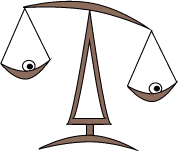Blind Justice
Created | Updated Jul 22, 2004

Or... Be Careful with that Sword Love, You'll Have Someone's Eye Out
Ever wondered what life in the law is really like? Ever thought you would get the opportunity of reading something written by a lawyer without being charged?
Before you run screaming from the room clutching your wallet, fear not. The purpose of this article is not to extract your hard earned pennies from your grasp. Rather it is (hopefully) the first in an irregular series of pieces designed to elucidate, enlighten and occasionally lampoon the legal profession and the law itself.
First Principles – The Boring Definition
What is a lawyer? Answers range from the usual definitions such as:-
A person that has been trained in the law and that has been certified to give legal advice or to represent others in litigation. Also known as a 'barrister', a 'solicitor' or an 'attorney'.
Of course there is also the other dictionary which, under 'lawyer' simply says 'see Shark (n)'.
The Actual Thing – No, Really, This Is What It Is
A lawyer is a generic term referring to one who practices or studies law. As far as local custom is concerned, it all turns around what the local judicial system calls its qualified lawyers. In England and Wales there are solicitors and barristers. Elsewhere there are attorneys, counsellors, deemsters and whole other variety of amusing pseudonyms for those sad individuals who wish to practice the law.
Kavanagh – My Posterior
Do not be fooled by the glamorous cross-examinations that are put forward by the one-eyed god of television. Just because television says it does not make it so. The realities of life in court are much seedier and far less rewarding – although they are not without humour on occasion.
Just bear in mind the fact that disputes about buildings (ie how they are built and whether they are faulty) can go on for weeks and the evidence is very technical. This makes sitting in court as interesting as experimental pile surgery. Anyone who has heard or seen the BBC series Chambers will no doubt recall the wagers between two barristers as to what invective can be slipped in to their submissions without the presiding judge noticing. This actually goes on – although the novelty wears off after a while.
Are They Senile?
Given what is said above you would be forgiven for concluding that the judiciary might not be able to see satire if it set fire to their robes. Not so.
There was an occasion when, in a High Court trial, both barristers and their respective instructing solicitors were called before the presiding judge. The names are withheld to protect the innocent, the guilty and the author who may well have been involved here.
A vital document was missing from the bundle before the judge.
The judge was livid. The document was key to the points that the prosecuting barrister was making and it was not available.
The solicitor for the Claimant suggested that this should not present a bar to the matter proceeding as the papers could be copied and sent by facsimile transmission to the judge's chambers.
The judge, who had only been half listening to the solicitor as he was speaking to the other barrister, turned and said;
'I beg your pardon?'
'Fax it up, my lord', replied the solicitor.
Tongue firmly in cheek the judge muttered, 'Yes, it does rather, doesn't it?'
More soon... if you can stand it.
